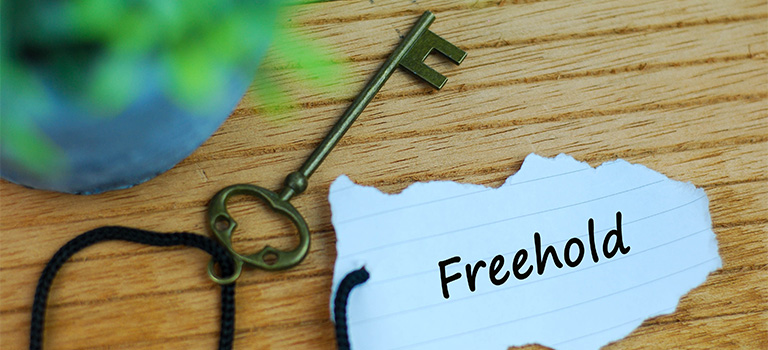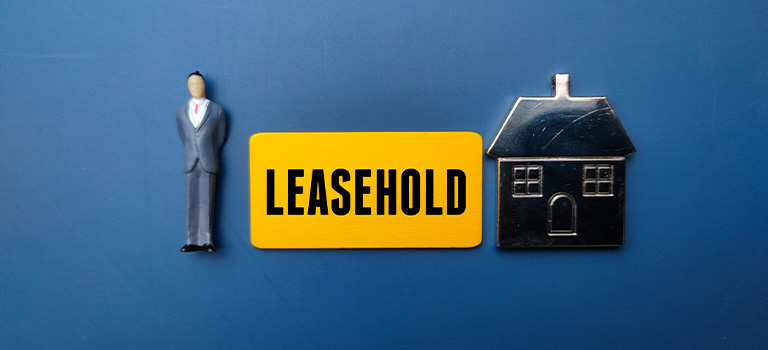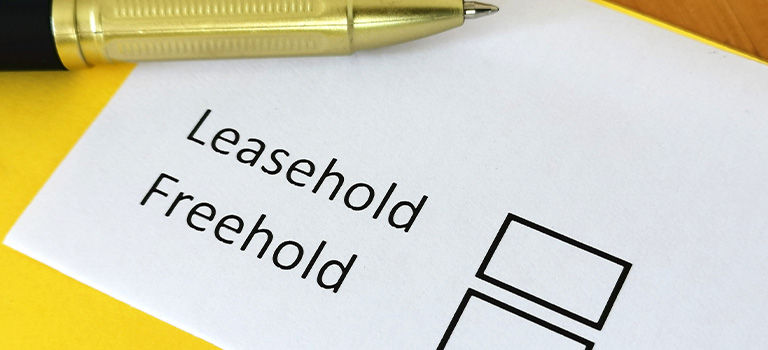Understanding freehold vs. leasehold property: Which one should you choose?
- Advice clinic
- 23.07.24
- Benham and Reeves
Exploring the property world can be overwhelming, especially when crossing international borders. If you’re interested in the UK property market, it is important to know that similar to Singapore, the UK offers both freehold and leasehold properties. However, you first need to understand the differences between the two since they may have a big impact on your investment. As you read further, we will bring out a clear picture between freehold and leasehold properties, offering insights and tips to help you make an informed choice.
The evolution of land rights and tenant protection
The 1920s introduced the modern leasehold system, which offered long-term leases to landowners, allowing them to earn a steady income while still retaining ownership. Leaseholds became important for selling units in multi-occupancy buildings in the 1950s as flat construction boomed. Legislation was passed in the 1960s to extend house leases by 90 years as many elderly tenants were left homeless due to expiring leases. However, it was in the 1990s that flat owners gained this right. Today, leaseholders enjoy significantly more rights than in the past.
Freehold property: top choice for long-term security

Owning freehold property entitles you to perpetual ownership of the building and land. This type of ownership is often considered safe because you have full control over the property, as long as you follow the local laws. It is simpler and more appealing to buyers seeking lasting security and control. However, there are a few exceptions, such as newly constructed homes or houses bought through shared ownership, where this rule doesn’t apply. A recent study by Benham and Reeves shows that the cost of freehold properties has increased by 6.5% in England and Wales. In 2023, freehold homes sold for an average of £300,000, 42% higher than the average pricing of leasehold properties.
Benefits of freehold property
If you own a freehold property in the UK, you have complete ownership and can pass it on to your descendants while keeping up with the mortgage payments. Such properties don’t have any ground rent or service charges, leading to significant long-term savings. Moreover, freehold properties are often considered superior long-term investments because of their perpetual ownership rights and lack of lease restrictions, making them more appealing for sustained value appreciation and financial stability.
Drawbacks of freehold property
As you also have ownership of the land, freehold houses in popular London areas usually come with a higher price tag compared to leasehold properties. You will often find these properties have higher property taxes and experience increased insurance costs. As the owner, you will also be responsible for all maintenance and repairs for the property, and it can turn out to be expensive.
But there’s a way you can save on these expenses through sharing a freehold property.
Buying a flat with a ‘share of freehold” lets you have partial ownership of the property and its land. This ownership will be split among other co-owners who also have a stake in the freehold. You have more control over the flats and say in their management too. This implies that you will not be under the control of a landlord who might take an undue advantage.
How does the share of freehold work?
As a co-owner of the property, you are responsible for upkeep of your share of the freehold. If you have a 50% stake in the freehold, you are responsible for maintaining half of the property’s condition. Freehold owners who don’t want added responsibility can hire a managing agent to handle maintenance if other leaseholders agree.
- Greater control and flexibility
- Challenges of shared freehold ownership
- Your budget: Freehold properties usually have a higher cost and ongoing maintenance responsibilities. Evaluate your finances to make sure that you can easily handle these costs. These properties are generally a safer investment, but they require a significant amount of initial outlay and ongoing expenses.
- Your long-term plans: Consider how long you plan to own and live on the property. A freehold property can be a better investment if you plan to stay long-term or pass it down to future generations, as it offers perpetual ownership and the potential for higher resale value. On the other hand, if you are looking for a short-term investment or a property in a prime location with a lower initial cost, a leasehold property can be a better option.
- Lease length: If you choose a leasehold property, pay close attention to the remaining lease term. A longer lease provides more stability and resale value, while properties with shorter leases can be more difficult to sell and may need expensive lease extensions. So, make sure the duration of the lease matches your ownership objectives and plans.
- Ground rent and service charges: Leasehold properties often come with ongoing costs such as ground rent and service charges. But now as per The Leasehold Reform (Ground Rent) Act 2022, effective from 30 June 2022, it abolishes ground rent charges for new leasehold properties. This legislation deals with previous concerns about increasing ground rent expenses, guaranteeing that new leaseholders will only have to pay a minimal “peppercorn” rent.
Owning a share of freehold property gives you more control over managing and maintaining the property. You can handle these tasks yourself or choose your agents, which can help you avoid high service charges and delays. It also makes lease extensions more affordable and convenient. This type of ownership also allows for property alterations to be made without the need for approval from the freeholder, providing flexibility.
Owners handle the maintenance, building insurance, and dispute resolution, which can be time-consuming and stressful. Maintenance and insurance costs are split among the co-owners, which can lead to disagreements. Furthermore, conflicts between co-freeholders can arise, making it difficult to manage the property or make necessary decisions such as extending or varying leases.
Leasehold property: a hybrid setup of ownership and renting

In the UK, if you have a leasehold property, you own it for a set period, usually 99 or 125 years, but not the land it was built on. At the end of the lease, the freeholder, who is the owner of the land, regains ownership of the property. This option is usually appealing to people looking for a more affordable way to own a property, especially in prime locations. The longest lease term allowed in the UK is 999 years. In 2022-2023 around 4.77 million leasehold homes in the UK were recorded, making up roughly 19% of the overall housing stock. It is imperative to note that, newly purchased flats have a high resale value, often selling for a higher price. Yet, as time goes on, the lease becomes shorter, making it important to check the lease duration. Also, new builds or off-plan options are attractive as they usually come with long leases.
Is having a share of freehold the same as a leasehold?
By having a leasehold, you have the right to use the property for a fixed time, but you are still obligated to pay ‘ground rent’ to the owner of the building and land. However, owning a share of freehold lets you own part of the building’s freehold as well as the leasehold for your individual property, unlike a leaseholder.
Benefits of leasehold property
Leasehold properties offer a more cost-effective way to get into the property market due to their lower purchase prices compared to freeholds, making them a great option for first-time buyers and investors. Freeholders usually take care of the building maintenance and repairs, which helps lessen the workload for individual leaseholders. Leaseholds with terms from 99 to 999 years provide stability. They are mostly used in apartments, making it easier to manage shared spaces. Lease extensions or freehold purchases are often available, providing flexibility. With lower costs and increased availability in cities, leaseholds are a practical option for many buyers.
Drawbacks of leasehold property
When the lease ends, the owner of the property can reclaim ownership of it, meaning you may need to negotiate a lease extension or buy the property to continue living there, which can be costly and daunting. Also, leaseholders usually have to pay ground rent and service charges to the freeholder and these costs can increase over time, contributing to the financial obligation. In addition, making significant modifications to your house requires the owner’s consent, which can restrict your control over the property.
Should I buy a freehold or leasehold property?

When deciding between freehold and leasehold property in the UK, you should weigh several key factors to make the best decision based on your needs and circumstances.
So, choosing between freehold and leasehold should be based on your investment goals, budget, and personal preferences when purchasing property. Freehold properties offer long-term security and control but require higher costs and more maintenance responsibilities. Leasehold properties are more affordable as they have shared maintenance, but they also come with additional expenses and possible restrictions. By thoroughly evaluating these factors, Benham & Reeves Singapore can make a well-informed decision and introduce you to the right property type. Feel free to reach out to us!
Source: Leasehold dwellings, 2022 to 2023 – gov.uk
About the Author
Benham & Reeves has been shaping London’s prime property market since 1958. In 1999, we launched one of the very first London‑focused estate agency offices in Singapore to cater to growing investor demand. We were among the first dedicated London‑focused branches outside the UK. Our dedicated Singapore office is in Raffles Hotel — from here, the experienced, multilingual agents work seamlessly to assist a discerning clientele with buying, selling and letting London properties. We further offer end-to-end support, sourcing, acquisition, lettings, furnishing and complete property management – all on Singapore time.View all posts by Benham and Reeves
